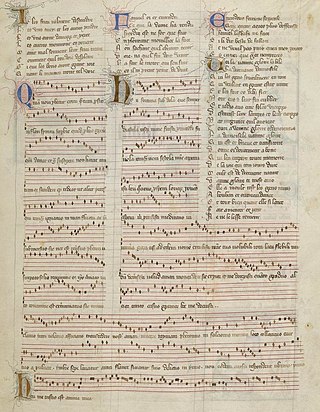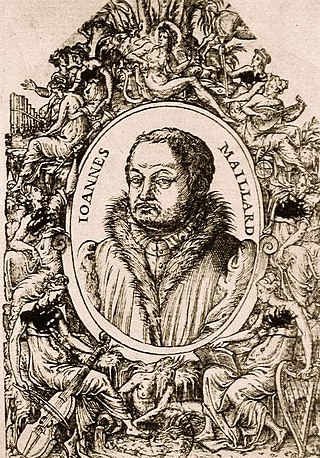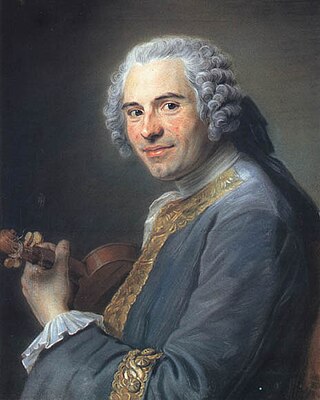Related Research Articles

In Western classical music, a motet is mainly a vocal musical composition, of highly diverse form and style, from high medieval music to the present. The motet was one of the pre-eminent polyphonic forms of Renaissance music. According to Margaret Bent, "a piece of music in several parts with words" is as precise a definition of the motet as will serve from the 13th to the late 16th century and beyond. The late 13th-century theorist Johannes de Grocheo believed that the motet was "not to be celebrated in the presence of common people, because they do not notice its subtlety, nor are they delighted in hearing it, but in the presence of the educated and of those who are seeking out subtleties in the arts".

Josquin Lebloitte dit des Prez was a composer of High Renaissance music, who is variously described as French or Franco-Flemish. Considered one of the greatest composers of the Renaissance, he was a central figure of the Franco-Flemish School and had a profound influence on the music of 16th-century Europe. Building on the work of his predecessors Guillaume Du Fay and Johannes Ockeghem, he developed a complex style of expressive—and often imitative—movement between independent voices (polyphony) which informs much of his work. He further emphasized the relationship between text and music, and departed from the early Renaissance tendency towards lengthy melismatic lines on a single syllable, preferring to use shorter, repeated motifs between voices. Josquin was a singer, and his compositions are mainly vocal. They include masses, motets and secular chansons.

Marc-Antoine Charpentier was a French Baroque composer during the reign of Louis XIV. One of his most famous works is the main theme from the prelude of his Te Deum, Marche en rondeau. This theme is still used today as a fanfare during television broadcasts of the Eurovision Network and the European Broadcasting Union.

Philippe de Vitry was a French composer-poet, bishop and music theorist in the ars nova style of late medieval music. An accomplished, innovative, and influential composer, he was widely acknowledged as a leading musician of his day, with Petrarch writing a glowing tribute, calling him: "... the keenest and most ardent seeker of truth, so great a philosopher of our age." The important music treatise Ars nova notandi (1322) is usually attributed to Vitry.
Pierre de Manchicourt was a Renaissance composer of the Franco-Flemish School.

Michel Richard Delalande [de Lalande] was a French Baroque composer and organist who was in the service of King Louis XIV. He was one of the most important composers of grands motets. He also wrote orchestral suites known as Simphonies pour les Soupers du Roy and ballets.

Loyset Compère was a Franco-Flemish composer of the Renaissance. Of the same generation as Josquin des Prez, he was one of the most significant composers of motets and chansons of that era, and one of the first musicians to bring the light Italianate Renaissance style to France.
Jean Mouton was a French composer of the Renaissance. He was famous both for his motets, which are among the most refined of the time, and for being the teacher of Adrian Willaert, one of the founders of the Venetian School.

Jean Maillard was a French composer of the Renaissance.
France has a rich music history that was already prominent in Europe as far back as the 10th century. French music originated as a unified style in medieval times, focusing around the Notre-Dame school of composers. This group developed the motet, a specific musical composition. Notable in the high Middle Ages were the troubadours and trouvères soon began touring France, composing and performing many original songs. The styles of ars nova and ars subtilior sprung up in the 14th century, both of which focused on secular songs. As Europe moved into the Renaissance age, the music of France evolved in sophistication. The popularity of French music in the rest of Europe declined slightly, yet the popular chanson and the old motet were further developed during this time. The epicenter of French music moved from Paris to Burgundy, as it followed the Burgundian School of composers. During the Baroque period, music was simplified and restricted due to Calvinist influence. The air de cour then became the primary style of French music, as it was secular and preferred by the royal court.

Jean-Joseph de Mondonville, also known as Jean-Joseph Cassanéa de Mondonville, was a French violinist and composer. He was a younger contemporary of Jean-Philippe Rameau and enjoyed great success in his day. Pierre-Louis Daquin claimed, "If I couldn't be Rameau, there's no one I would rather be than Mondonville".
Magdala was an ancient city on the shore of the Sea of Galilee believed to be the birthplace of Mary Magdalene.
The decade of the 1530s in music involved some significant events, publications, compositions, births, and deaths.
Francesco Cellavenia was an Italian composer of the Renaissance, active in Casale Monferrato.
David Skinner is a British musicologist and choir director. He works at the University of Cambridge, where he is the director of music at Sidney Sussex College and is an affiliated lecturer, teaching historical and practical topics from the medieval and Renaissance periods. He is the founder of the vocal consort Alamire, and the cofounder of the vocal ensembles Magdala and The Cardinall's Musick. He has produced more than 25 recordings. He has been associated with a number of award-winning projects.
Hervé Niquet is a French conductor, harpsichordist, tenor, and the director of Le Concert Spirituel, specializing in French Baroque music.

Jean-Baptiste Lully was a French composer, dancer and instrumentalist of Italian birth, who is considered a master of the French Baroque music style. Best known for his operas, he spent most of his life working in the court of Louis XIV of France and became a French subject in 1661. He was a close friend of the playwright Molière, with whom he collaborated on numerous comédie-ballets, including L'Amour médecin, George Dandin ou le Mari confondu, Monsieur de Pourceaugnac, Psyché and his best known work, Le Bourgeois gentilhomme.

Psalm 127 is the 127th psalm of the Book of Psalms, beginning in English in the King James Version: "Except the Lord build the house". In Latin, it is known by the incipit of its first 2 words, "Nisi Dominus". It is one of 15 "Songs of Ascents" and the only one among them attributed to Solomon rather than David.
The grand motet was a genre of motet cultivated at the height of the French baroque, although the term dates from later French usage. At the time, due to the stylistic feature of employing two alternating choirs, the works were typically described as motet pour deux choeurs - motet for double choir.
The Gift of Music is an English record label specializing in nostalgia, classical, folk, and historical-themed compilation recordings. The unusual aspect of the record label is that its marketing strategy is focussed on sales at museums, National Trust houses, and other British and Irish tourist attractions rather than focussed on traditional music retail markets. The label's releases are usually designed around historical themes likely to complement museums and tourist attractions, and issues include both re-issued recordings and new commissions.
References
- ↑ Dr David Skinner - College Fellows and Staff - Sidney Sussex
- ↑ Alamire - David Skinner "..where he conducted Magdala, the mixed-voice chapel choir, with whom he ..."
- ↑ "Digital Image Archive of Medieval Music :: Case MS VM1578.M91". www.diamm.ac.uk. Retrieved 2023-04-18.